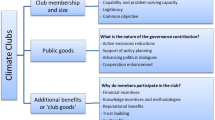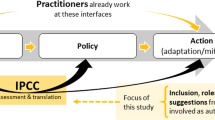Abstract
This year (2015) marks the 21st formal anniversary of the United Nations Framework Convention on Climate Change (UNFCCC) and in December a new climate treaty is expected to be reached. Yet, the UNFCCC has not been successful in setting the world on a path to meet a target to prevent temperatures rising by more than 2 °C above pre-industrial levels1. Meanwhile, other forums, such as the G20 and subnational forums, have increasingly become sites of climate change initiatives2,3,4,5,6. There has, however, so far been no systematic evaluation of what forums climate change policymakers and practitioners perceive to be needed to effectively tackle climate change. Drawing on survey data from two recent UNFCCC Conference of the Parties (COP), we show that there exists an overall preference for state-led, multilateral forums. However, preferences starkly diverge between respondents from different geographical regions and no clear alternative to the UNFCCC emerges. Our results highlight difficulties in coordinating global climate policy in a highly fragmented governance landscape.
This is a preview of subscription content, access via your institution
Access options
Subscribe to this journal
Receive 12 print issues and online access
$209.00 per year
only $17.42 per issue
Buy this article
- Purchase on Springer Link
- Instant access to full article PDF
Prices may be subject to local taxes which are calculated during checkout
Similar content being viewed by others
References
Jordan, A. et al. Going beyond two degrees? The risks and opportunities of alternative options. Clim. Policy 13, 751–769 (2013).
Keohane, R. O. & Victor, D. G. The regime complex for climate change. Perspect. Polit. 9, 7–23 (2011).
Bulkeley, H. et al. Transnational Climate Change Governance (Cambridge Univ. Press, 2014).
Kim, J. & Chung, S-Y. The role of the G20 in governing the climate change regime. Int. Environ. Agreements 12, 361–374 (2012).
Weischer, L., Morgan, J. & Patel, M. Climate clubs: Can small groups of countries make a big difference in addressing climate change? Rev. Eur. Community Int. Environ. Law 21, 177–192 (2014).
Karlsson-Vinkhuyzen, S. I. & McGee, J. Legitimacy in an era of fragmentation: The case of global climate governance. Glob. Environ. Polit. 13, 56–78 (2013).
Falkner, R., Stephan, H. & Vogler, J. International climate policy after Copenhagen: Towards a ‘building blocks’ approach. Glob. Policy 1, 252–262 (2010).
Eckersley, R. Moving forward in the climate negotiations: Multilateralism or minilateralism? Glob. Environ. Polit. 12, 24–42 (2012).
Naim, M. Minilateralism: The magic number to get real international action. Foreign Policy 173, 135–136 (2009).
Grasso, M. & Roberts, T. A compromise to break the climate impasse. Nature Clim. Change 4, 543–549 (2014).
Victor, D. Plan B for Copenhagen. Nature 461, 342–344 (2009).
Hare, W., Stockwell, C., Flachsland, C. & Oberthür, S. The architecture of the global climate regime: A top-down perspective. Clim. Policy 10, 600–614 (2010).
Winkler, H. & Beaumont, J. Fair and effective multilateralism in the post-Copenhagen climate negotiations. Clim. Policy 10, 638–654 (2010).
Cole, D. H. Advantages of a polycentric approach to climate change policy. Nature Clim. Change 5, 114–118 (2015).
Rayner, S. How to eat an elephant: A bottom-up approach to climate policy. Clim. Policy 10, 615–621 (2010).
Dai, X. Global regime and national change. Clim. Policy 10, 622–637 (2010).
Abbott, K. W. The transnational regime complex for climate change. Environ. Plan. C 30, 571–590 (2012).
Zürn, M. & Faude, B. Commentary: On fragmentation, differentiation, and coordination. Glob. Environ. Polit. 13, 119–130 (2013).
Bäckstrand, K. Accountability of networked climate governance: The rise of transnational climate partnerships. Glob. Environ. Polit. 8, 74–102 (2008).
Biermann, F., Pattberg, P., van Asselt, H. & Zelli, F. The fragmentation of global governance achitectures: A framework for analysis. Glob. Environ. Polit. 9, 14–40 (2009).
McGee, J. & Taplin, R. The Asia-Pacific partnership and market-liberal discourse in global climate governance. Int. J. Law Context 10, 338–356 (2014).
Huang, J. A Leadership of Twenty (L20) Within the UNFCCC: Establishing a legitimate and effective regime to improve our climate system. Glob. Gov. 15, 435–441 (2009).
NAZCA: Non-State Actor Zone for Climate Action (UNFCCC, accessed 12 May 2015); http://climateaction.unfccc.int
International Cooperative Initiatives Database (UNFCCC, accessed 12 May 2015); http://unfccc.int/focus/mitigation/items/7907.php
Betzold, C. Responsiveness or influence? Whom to lobby in international climate change negotiations. Int. Negot. 19, 35–61 (2014).
Böhmelt, T., Koubi, V. & Bernauer, T. Civil society participation in global governance: Insights from climate politics. Eur. J. Polit. Res. 53, 18–36 (2014).
Parker, C., Karlsson, C., Hjerpe, M. & Linnér, B-O. Fragmented climate change leadership: Making sense of the ambiguous outcome of COP-15. Environ. Polit. 21, 268–286 (2012).
Nasiritousi, N., Hjerpe, M. & Buhr, K. Pluralising climate change solutions? Views held and voiced by participants at the international climate change negotiations. Ecol. Econ. 105, 177–184 (2014).
Linnér, B-O. & Pahuja, N. A registry for nationally appropriate mitigation actions: Goals, outcomes and institutional requisites. Ambio 41, 56–67 (2012).
Friman, M. & Hjerpe, M. Agreement, significance, and understandings of historical responsibility in climate change negotiations. Clim. Policy 15, 302–320 (2015).
Nasiritousi, N., Hjerpe, M. & Linnér, B-O. The roles of non-state actors in climate change governance: Understanding agency through governance profiles. Int. Environ. Agreements http://dx.doi.org/10.1007/s10784-014-9243-8 (2014)
Buhr, K., Roth, S. & Stigson, P. Climate change politics through a global pledge-and-review regime: Positions among negotiators and stakeholders. Sustainability 6, 794–811 (2014).
Buhr, K. & Hjerpe, M. Expectations on corporate climate action under regulatory uncertainty. Int. J. Clim. Change Strateg. Manag. 4, 403–419 (2012).
List of Participants, Conference of the Parties, Nineteenth Session (UNFCCC, accessed 12 May 2015); http://unfccc.int/resource/docs/2013/cop19/eng/inf04.pdf
List of Participants, Conference of the Parties, Twentieth Session (UNFCCC, accessed 12 May 2015); http://unfccc.int/resource/docs/2014/cop20/eng/misc01p01.pdf
Hjerpe, M. & Linnér, B-O. Functions of COP side-events in climate-change governance. Clim. Policy 10, 167–180 (2010).
Acknowledgements
We would like to thank D. Bastviken, M. Fridahl, B-O. Linnér and H. Schroeder for valuable suggestions on a previous draft, colleagues in the International Negotiations Survey team who assisted in handing out surveys during COP 19 and COP 20, the Swedish Research Council, under grant award No. 421-2011-1862, and Formas, under grant award No. 2011-779.
Author information
Authors and Affiliations
Contributions
M.H. and N.N. jointly designed the study, developed the methodology, performed the analysis, and wrote the manuscript.
Corresponding author
Ethics declarations
Competing interests
The authors declare no competing financial interests.
Supplementary information
Rights and permissions
About this article
Cite this article
Hjerpe, M., Nasiritousi, N. Views on alternative forums for effectively tackling climate change. Nature Clim Change 5, 864–867 (2015). https://doi.org/10.1038/nclimate2684
Received:
Accepted:
Published:
Issue Date:
DOI: https://doi.org/10.1038/nclimate2684
This article is cited by
-
Legitimacy in the trans-scalar governance of climate adaptation
npj Climate Action (2023)
-
Climate negotiators’ and scientists’ assessments of the climate negotiations
Nature Climate Change (2017)
-
Towards minilateralism
Nature Climate Change (2015)



